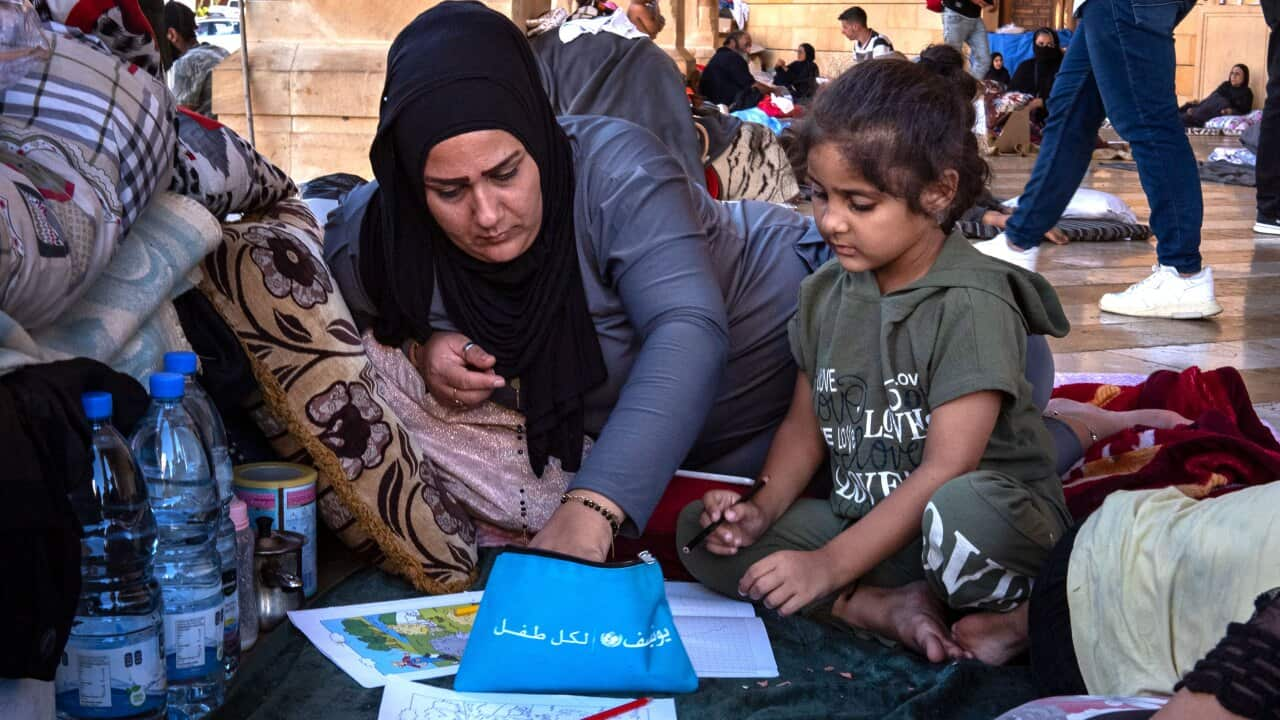United Nations aid agencies in Lebanon are trying to shelter large numbers of displaced people as Israeli airstrikes on Beirut continue and fighting between Israel and Hezbollah escalates on Lebanon’s southern border.
Israel’s military urged residents of over 20 towns in south Lebanon as it pressed on with an incursion after suffering its worst losses in a year of fighting the Iran-backed militant group.
Israeli airstrikes and fighting along the border have killed hundreds, wounded thousands and displaced around 1.2 million people, according to the Lebanese government.
“It’s safe to say that this is escalating and really affecting families in Lebanon,” United Nations International Children’s Emergency Fund (UNICEF) spokesperson Tess Ingram said.
Ingram said the impact was particularly hard on children, “many of whom have been displaced from their homes with nothing but the clothes on their backs,” she told SBS News in a television interview.
At shelters across the country, “UNICEF is trying to provide them with the basics that they need to survive. But many of these families have almost nothing”.
“There are more than 850 shelters that have opened across Lebanon. So the needs are great right across the country,” Ingram said.
“We’re now attending to shelters, bringing food and water and blankets and mattresses and the basics that people need to get through this immediate time of catastrophe.”
Ingram said UNICEF was dealing with “a very vulnerable population” as Lebanon was now in the fifth year of a political and economic crisis.
“There was and, of course, COVID-19. So this conflict comes on top of all of those preexisting crises and compounds an already very difficult situation.
“UNICEF is calling for US$105 million ($153.4 million) just to get us through the next three months in this response, to make sure that we can meet the needs of families and children,” Ingram said.
Israel after two weeks of intense airstrikes. In and several large plumes of smoke were rising after heavy strikes. Hezbollah has its headquarters in Beirut’s southern suburbs.
Meanwhile, Hezbollah said it detonated an improvised explosive device against Israeli forces infiltrating a southern Lebanese village.
UN resident and humanitarian coordinator in Lebanon Imran Riza told Reuters the level of trauma and fear amongst the population “has been extreme”.
“You’ve got people being displaced from one place to another, thinking they were going to a safe place, and then that being struck,” he said.
Riza said 97 medical and emergency workers had been killed — the majority of them in the last 10 days. There has been too much damage to civilian infrastructure, and civilians have been “bearing the great brunt of what’s been going on,” he said.
The world’s divided attention
Both Israel and Hamas say the Lebanon conflict could help end the Gaza conflict, but some analysts, officials from mediating countries, and Gazans are reportedly sceptical.
“The focus is on Lebanon, which means the war in Gaza isn’t ending anytime soon,” Hussam Ali, a 45-year-old Gaza resident who said his family had been displaced seven times since the conflict between Israel and Hamas began on October 7 last year, told Reuters via a chat app.
When , provoking an Israeli promise of a “painful” response, some Gazans welcomed the attacks overhead as a sign Tehran was fighting for their cause.
Sami Abu Zuhri, a senior Hamas official, said prospects for a Gaza ceasefire deal, which would see the release of Israeli hostages held in Gaza and Palestinians jailed by Israel, were distant before the escalation in Lebanon. A regional conflagration could lead to pressure on Israel to strike a deal in Gaza, he said.
But with attention swinging to Lebanon, the war in Gaza risked being prolonged, said Ashraf Abouelhoul, managing editor of state-owned newspaper Al-Ahram in Egypt, which has helped to mediate months of ceasefire negotiations.
“The most dangerous thing isn’t that the media attention is going somewhere else, it is the fact that no one in the world is now talking about a deal or a ceasefire, and that frees Israel’s hand to continue its military offensive and plans in Gaza,” he said.
As the war in Gaza triggered by the cross-border Hamas attack on Israel nears its first anniversary on 7 October, there has been no let-up in Israeli military operations against the Palestinian political and military group.
Ninety-nine Palestinians have been killed and 169 wounded in the past 24 hours, the ministry said in a statement.
Medics said scores of people were killed a day before in an Israeli strike that hit a school sheltering displaced families in Gaza City, while another struck the al-Amal Orphan Society, which also houses displaced persons.
“It’s very difficult for the world to maintain attention on so many crises at the moment, from Sudan to Gaza, to Ukraine, to Lebanon,” said Ingram, who was previously in Gaza.
“I think we need to maintain that focus to ensure that the pressure of the international community calling for a ceasefire continues and that the interests of children continue to be advocated for,” she said.
“At the very least, this is a war on children, and we’re seeing children bear the greatest impact of this violence,” she said of Israel’s attack on Gaza.
Israel’s assault on Gaza following the Hamas-led October 7 assault on southern Israel has now killed more than 41,000 people, according to the Palestinian health ministry,
Hamas killed around 1,200 people and took around 250 hostages on 7 October, according to Israeli tallies.
